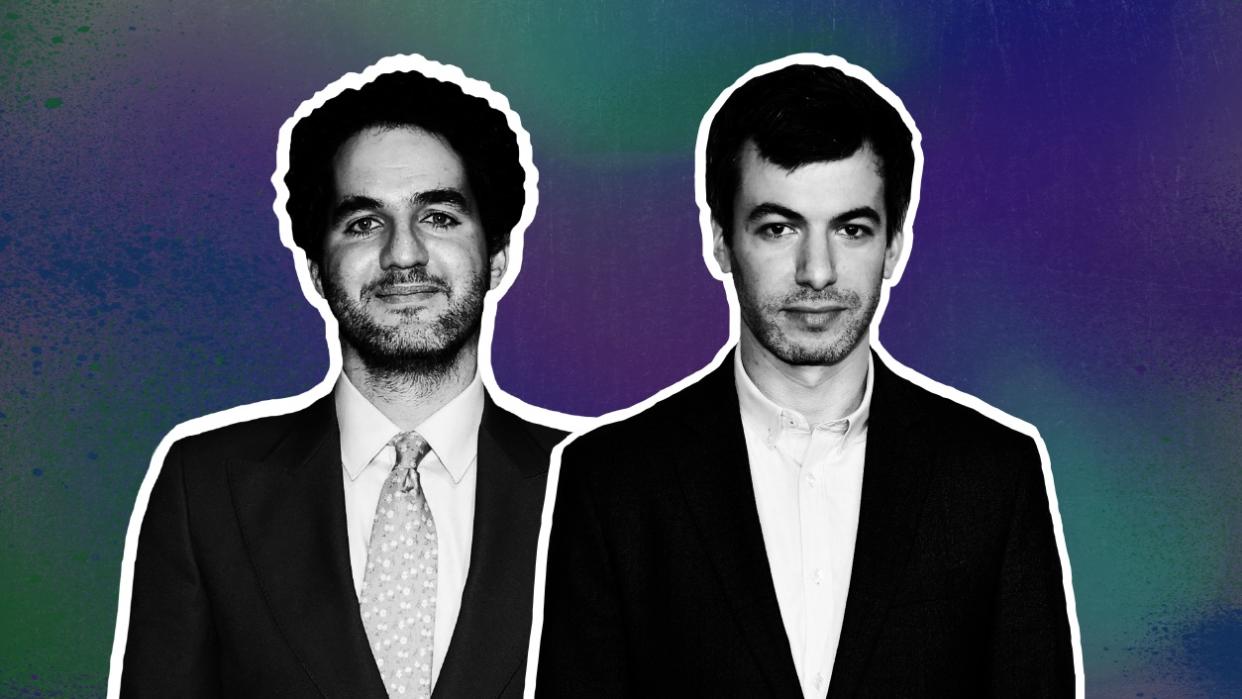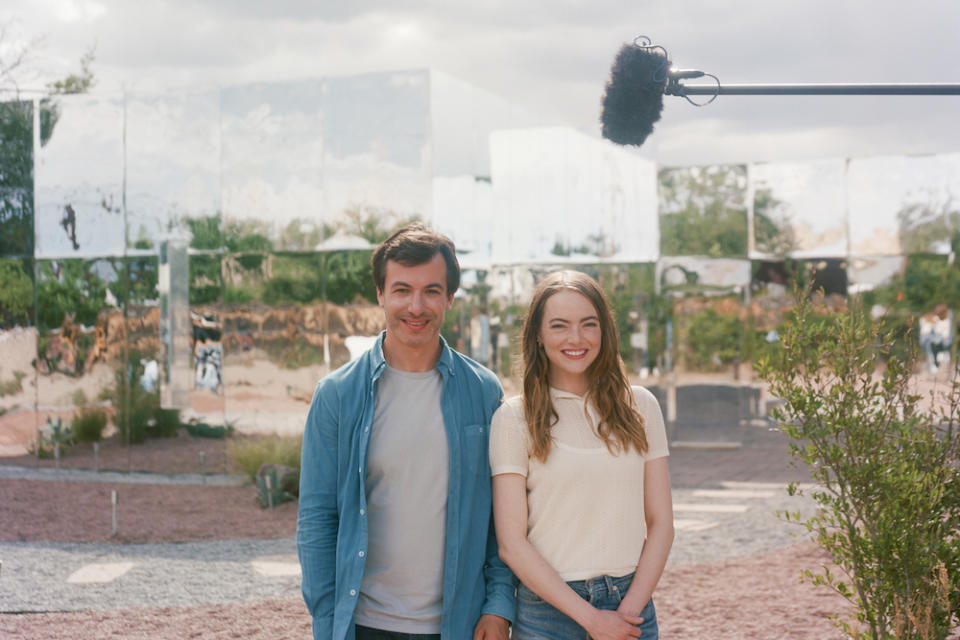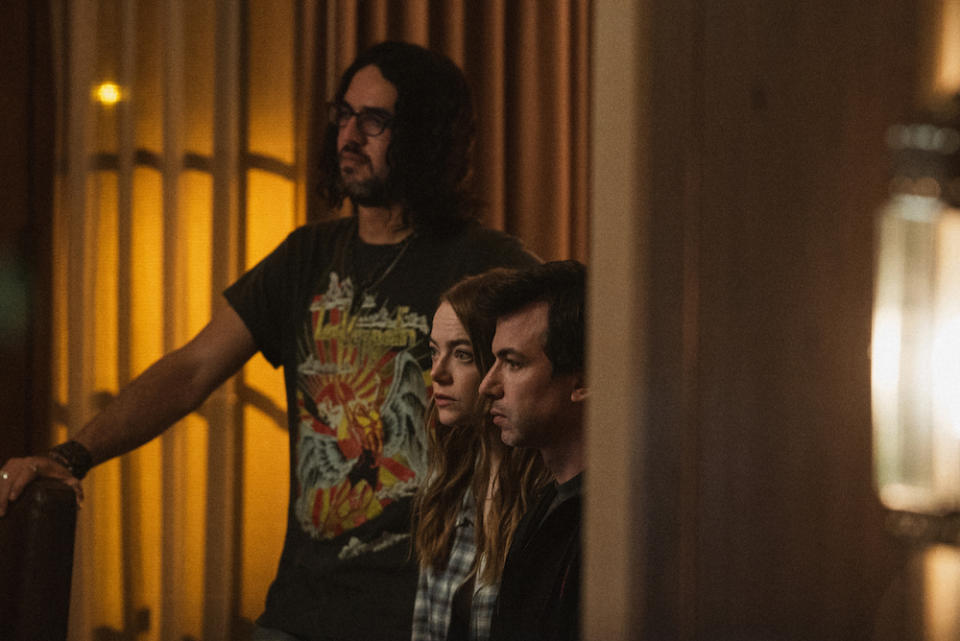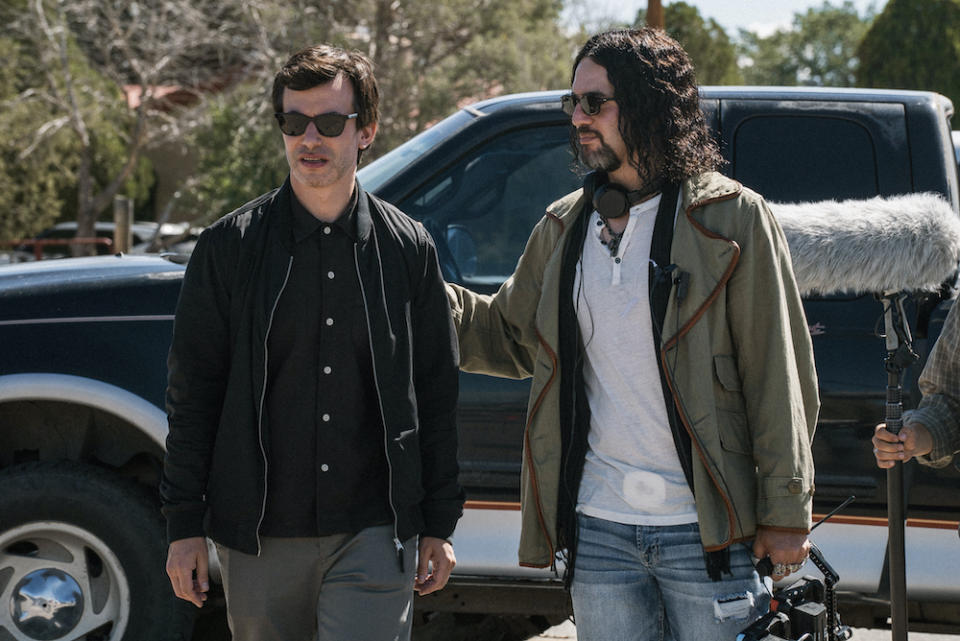Nathan Fielder and Benny Safdie Nearly Talked Themselves Out of Making ‘The Curse’

- Oops!Something went wrong.Please try again later.
- Oops!Something went wrong.Please try again later.
- Oops!Something went wrong.Please try again later.

On December 6, the 2023 IndieWire Honors ceremony will celebrate 11 filmmakers, creators, and actors for their achievements in creative independence. We’re showcasing their work with new interviews leading up to the Los Angeles event.
“I think murder is illegal. I think you can’t murder people.”
More from IndieWire
Emma Stone's Remarkable Performance Is the Key to Cracking 'The Curse'
Bold Speeches from Auteurs and Comfy Couches: IndieWire Honors 2023 Is the Awards Show Like No Other
That’s Nathan Fielder, using his signature deadpan delivery to land a joke about the complexities of modern legalese. Sitting in an unadorned room somewhere in Los Angeles, with gray stubble to match the streaks in his dark, disheveled hair, the writer, director, and comedian was just explaining how, exactly, they got away with name-checking HGTV in “The Curse” — a series satirizing, among other targets, the kind of home improvement shows that built the cable channel into a reality TV juggernaut.
“[After] ‘Nathan For You,’ I did become a bit of an expert on parody law and fair use,” Fielder said. “I think if you’re making a comment on it, you’re allowed to use it.”
“We never thought about that [stuff],” Benny Safdie said, who joined Fielder on the Zoom call. “We just used HGTV. There was a lot of pushback in general about brands, and I would always be like, ‘Literally, Nathan created a Starbucks and it was fine.’
“We were the two worst people to talk to about clearance issues and all that stuff.”
“A couple people wondered [about permissions] along the way,” Fielder said, “and I think we just told them, ‘You don’t have to talk to lawyers. We know.'”
Jokes aside, Fielder admits it’s confusing territory. He remembered being told on previous projects not to say this or use that, but when he would suggest a solution, responses usually lacked any absolute assurances. “You eventually realize,” he said, “‘Oh, there’s not really a law for a lot of things.’ It’s more just: What risk do people want to take? I didn’t know that. I thought it would be clearer what is illegal and what isn’t.”
Not that complexity is a deterrent for either creator. Quite the opposite. Be it “Nathan For You” or “The Rehearsal,” “Uncut Gems” or “Good Time,” their meticulous stories tend to reward repeat viewings, and their first collaboration is no different. “The Curse” is a brilliant amalgamation of each artist’s skills and curiosities. Whitney (Emma Stone) and Asher (played by Fielder) are a recently married couple building environmentally friendly homes in a small New Mexico community — and trying to launch their own reality show in the process. Dense and mysterious, tense and engrossing, the series feels like a nervy thriller, a black comedy, and a marriage drama stuffed under the same sustainable roof.
But rather than intimidate them, Fielder and Safdie saw intricacy as the draw. Without the challenge, “The Curse” wouldn’t even exist.
“We tried to talk ourselves out of it,” Safdie said. “We were like, ‘This isn’t a good idea.’ But then we couldn’t help but think of other things that would build into this or play off of that. We really were just having a good time talking about making this as complicated as possible.”
“It wasn’t like, ‘Oh, let’s make a show together,'” Fielder said. “It was literally just that we were texting and talking for months and months.”
Friendship First, Work Second
Fielder and Safdie first met in 2017, but they’d been admirers of each other’s work for years prior, and Safdie’s first impression was shaped from afar.
“There was a subway ad that I sent to my wife in 2015,” he said. “I had already been seeing all of these ‘Blacklist’ ads all over the place and they’d been bothering me. I’d been so annoyed by them, and I had been talking her ear off about it. Then I go down on the train, and I [see these parody ads], and I’m like, ‘Wait, what are the chances that my favorite show on television has an ad on the subway making fun of the exact thing that I hate?’ It was too perfect.”
The show, of course, was “Nathan For You,” though Fielder still refutes any disdain for the NBC drama. “We weren’t making fun of ‘The Blacklist.’ It was parallel thinking,” he said, echoing remarks about a recent ad campaign with remarkable similarities to another film’s trailer.

“When we finally met up, I had written this essay in Cinemascope magazine [on ‘Nathan For You’], so I had a pretty high expectations,” Safdie said. “I guess we just hit it off because from there, every time I went to LA I would always reach out, just to kind of start a friendship. It’s weird to think it was like, ‘You know what? I want to be friends with that guy. I like him.'”
“That’s so sweet, Benny. That’s so nice to hear. We’ve never talked about this,” Fielder said, as he thought back to his initial, equally emotional reaction to meeting Safdie. “I think Benny was taller than I thought he was. How tall are you, Ben? You’re like 6’2”?”
“6’1” on a good day,” Safdie said.
“Are you shorter than Robert Pattinson?”
“I’m bigger than him.”
“Oh,” Fielder said. “Were you on your knees in that movie or something?”
“I wasn’t, but I was definitely–“
“Hunched over?”
“–I was taken advantage of by him,” Safdie said, referring to his character in the film. “So that’s probably why it felt that way.”
“You mean psychologically [taken advantage of]…”
“Yes, yes,” Safdie said, laughing off his partner’s unflinching bit.
Throughout our 40-minute interview, Safdie and Fielder are surprisingly relaxed and chatty. Fielder isn’t prone to opening up about his work (or himself) and lasts about 15 minutes before admitting he feels “insecure” about his answers. “I’m realizing Benny is so much better at talking about the show than me,” he said. “I’m having an experience over here of like, ‘Oh yeah, this is why I don’t do these things.’ It’s so uncomfortable.”
His responses, in fact, are thorough and thoughtful. If anyone had reason to be uncomfortable, it’s Safdie. Before the interview began, Fielder and I were told Safdie was running late due to subway traffic. Fielder then sent a text, suggesting he call in from the train, and when Safdie did just that — standing at the 34th St. station, wearing a blue coat with red lining and a white baseball cap — Fielder quickly said, “I was joking!” But Safdie merely smiled, assured us he was fine, and started talking. (“No one knows who I am,” he said, which seems impossible given his role in Christopher Nolan’s summer blockbuster “Oppenheimer,” but he was right. No one approached him during our call, even when he stopped mid-sentence to help an elderly man catch a train.)
Together, the two artists have an easy rapport, and as soon as I inquired about “The Curse’s” origins, Fielder and Safdie went back and forth recounting events for 10 uninterrupted minutes.
“It all started when we were just talking about Nathan first moving to L.A.,” Safdie said.
“I was trying to encapsulate odd experiences I had since I moved here,” Fielder said. “L.A. sometimes feels like … there’s something off.”
Exhibit A: Fielder, on a routine trip to pick up a new cell phone, was stopped by a woman asking for spare change. He didn’t have any, told her as much, and she responded by looking him straight in the eye and saying, “I curse you.” Fielder went on his way, but couldn’t stop thinking about the stranger’s sharp words. So he went to an ATM, got $20, and handed it to her. Just like that, she lifted the curse.
When Safdie heard the story, he asked Fielder, “What would’ve happened if you went back there and she wasn’t there? Then your whole life would be ruined because the curse would just be on you. It would be something that you had to think about forever, and you’d never know for sure whether or not something happened to you because of that or not.”
“I don’t believe in that stuff, Fielder said, “but I can’t get those things out of my head. Sometimes if someone says something to you, even conversationally, where you feel like you messed up something, it can linger in your mind and grow and consume you. Then we just started riffing on that idea, like, ‘Wouldn’t it be interesting if that vibe was hanging over an entire show?'”

Finding ‘the Seeds’ of Truth in Reality TV
With a few tweaks (he meets a young girl instead of a grown woman), Fielder’s true story came to shape “The Curse,” but at the time, it was just an idea. They had a vibe without a story, and they weren’t looking to create a new series anyway. Then, while Safdie’s wife was pregnant, he spent a lot of time in doctors’ waiting rooms, held captive by TVs blaring home renovation shows. He became obsessed, primarily with the relationships of the hosts and their families.
“What you stop thinking about is: Where are these places?” Safdie said. “One trip when I was out in LA, I was watching a bunch of stuff and the tagline, ‘If you don’t like your neighborhood change it,’ came on. I immediately texted Nathan: ‘This is it.’ This is crazy. How is that a possible thing?”
Given Fielder’s long-standing fascination with reality TV, he sparked to the question, and the duo started outlining a story — just to see if it could work. Even at that early stage, Fielder said they had a lot of “twists and turns” in mind, and they weren’t sure if the same series could sustain them all. “We ended up mapping out the whole thing,” Fielder said. “Then we pitched it, and it came together [quickly.] We didn’t hit a lot of roadblocks in terms of the tone. The vibe of it was pretty much there from the start.”
Finally, “The Curse” was set. With a married couple striving for reality TV stardom at its center and a jinx plaguing their every move (or does it?), Fielder and Safdie had a story rife with possibility — and one they couldn’t deny.
“Whatever that feeling is,” Fielder said, “it’s the core of the show in a lot of ways. They’re projecting things that may or may not exist onto everyone around them, and everyone is sort of doing that to each other. That idea of what’s actually real or what matters in a situation is a lot of what the show is exploring and reveling in. Because it’s easy to sort of go, ‘Oh, well this person’s good or bad,’ or ‘This is real or fake.’ But in a lot of these situations, it’s so much more complicated than that.”
“We’re both interested in what reality television tells you about people and how you can see through it to get at the [truth] of something,” Safdie said. “Even though everything about it is constructed, there’s still seeds of truth in there.”
“We are in a time where everyone feels pressure to tell their story and who they are, but not everyone is a storyteller,” Fielder said. “Not everyone is a filmmaker, not everyone is a writer. So the people that aren’t the most skilled at doing this stuff, how do they do it? What is the real version if they can’t execute it well? Is that a fake version of them, or is that honest?”
Fielder pointed to Dougie and Whitney’s clashing visions for their HGTV show. Dougie, the sleazy producer played by Safdie, is drawn to conflict. He wants to entertain audiences and often seems bored by the altruistic version Whitney wants to make. She, in turn, sees Dougie’s suggestions as crass and debilitating. If their show, “Fliplanthropy,” is going to change people’s hearts and minds for the better, its hosts can’t be anything less than paragons. Dougie wants to shoot what’s actually happening, only heightened. Whitney wants to craft an idyllic interpretation, which leaves out certain facts.
“Everyone involved is genuinely searching and fighting for what they believe is a truth,” Fielder said. “Dougie is seeing stuff that he feels is representative of their life that Whitney doesn’t. […] People are trying to convey the truth with the awkward tools of reality television.”
The tools, though, are not to be trusted. Way back before “The Curse,” before “Nathan For You,” Fielder was hired as a segment producer on “Canadian Idol.” It was his first job in reality television, and one of his assignments was to interview contestants.
“As an interview tactic, they taught me to mimic the expression of the person in a [suggestive] way,” Fielder said. “You don’t want to say any words — you don’t want your audio mixing in with [the contestant’s] because you’re not in the show — so you want to sort of nod and almost agree with them. If you want them to be sad, you go [Nathan makes a frowning face] and then they emote more.”
Fielder passed all his lessons onto Safdie, so Dougie could use them during interview scenes in “The Curse.” You see a few on display in the very first scene, when Dougie tries to elicit reactions from Fernando (Christopher Calderon) and his sick mother, Isabel (Maria Yadira Frias), by encouraging what Safdie called “big emotions.”
“It’s just amazing because when you learn that kind of stuff, you could have so much fun with it,” he said. “Once you give that information to Dougie, he goes wild. My favorite moment is in a later episode, during an interview with Dougie and Asher. It really was this meta thing where Nathan and I are both having fun with each other, but also playing these characters. I’m going so overboard with that knowledge Nathan gave me about trying to get him to emote. It was almost disgusting, but it was so fun.”

‘Oh, wait a second. Do you want to be in a TV show?’
Co-creators, co-writers, co-stars — Safdie and Fielder’s responsibilities just kept piling up, and it didn’t let up during production.
“Everything changed once we were on the ground in Espanola,” Safdie said, “because we wanted to cast people from the area, and we wanted to shoot in the real locations. We wanted to incorporate the entire community and all of their issues and problems into the show.”
To do this, Safdie and Fielder spent time in New Mexico prior to principal photography. Fielder spoke to locals with varied backgrounds and visited the Picuris Pueblo, where he met with the tribe’s leader, Governor Quanchello. With the help of Ashley Browning, a consulting producer, they obtained hard-to-come-by permits to film at the Buffalo Thunder Resort and Casino (under the name Whistling River Casino), the Black Mesa, and the Center for Contemporary Arts in Santa Fe. The team assured locals they would be as accurate as possible in representing the community.
That included onscreen representation. Casting directors Jennifer Vinditti and Angelique Midthunder held open calls, searched the internet, and hired people off the street — some who’d never acted before. They were often assisted by Fielder and Safdie themselves.
“You’re just always looking,” Safdie said. “If you ask somebody for directions and they answer you in a specific way that’s interesting, we would be like, ‘Oh, wait a second. Do you want to be in a TV show? We’re shooting it here next week.’ And they’re like, ‘Oh yeah, for sure,’ and I get their information and you take the photo and you send it along.
“Nathan would find people, and I was maybe a little bit better at going up to them, so he would be like, ‘Go and ask that person.'”
“Sometimes they come up to us and they’re like, ‘What are you shooting?'” Fielder said. “They might say, ‘Oh, you know, I did some acting before.’ Then we’ll go through our head really quickly of the roles we’re trying to find. Then we’ll put them in touch with the casting person and then they’ll either read the for part, or it might be so small that we’re just like, ‘OK, they can do it.'”
They found Edward Martinez, who plays Asher’s construction head, while on a location scout. The cashier at the coffee shop was a cashier at the local coffee shop. Some locals were “so amazing” Fielder and Safdie said they created roles just for them.
“Basically, we just wanted to open up the world to everybody there because they know more about the community than we do,” Safdie said. “We could do all this research, but when you get them in the show and you start asking them [questions], they’re going to tell you, ‘It wouldn’t happen this way,’ or ‘it happened that way.’ You just have to be open to listening to them.”
Safdie described the process of making “The Curse” as an increasingly complex web of their own creation. They may not have set out to make a TV show, but the show they decided to make steadily grew in scope and ambition until even the creators had only one option: to see it through.
“All of a sudden, what started out as one thing became something even more complicated,” he said. “We were both just in it to try and understand it.”
Now, it’s in the hands of its audience. So far, “The Curse” has been praised by critics as “an intensely compelling character study” (Shirley Li, The Atlantic), “surprisingly moving” (Inkoo Kang, The New Yorker), and “a brain-breaking revelation” (Judy Berman, Time). More than one review echoed the latter’s awed bewilderment, which only seems even more apt given the creators’ own enthusiasm for untangling its many threads.
“The mantra was: Whenever we come to an idea together, it’s always better than when one of us comes at it [alone] and the other person isn’t on board with it,” Safdie said. “[Our collaboration] made everything deeper, it made everything funnier, and it made everything more exciting. It really was just a great experience, and it was all constantly evolving and constantly alive. And it still is.”
“This is why I let Benny do most of the talking,” Nathan said.
“The Curse” releases new episodes Fridays on Paramount+ with Showtime and Sundays at 10 p.m. ET on Showtime’s linear channels.
Best of IndieWire
Where to Watch This Week's New Movies, Including 'Poor Things' and 'The Boy and the Heron'
Quentin Tarantino's Favorite Movies: 59 Films the Director Wants You to See
Sign up for Indiewire's Newsletter. For the latest news, follow us on Facebook, Twitter, and Instagram.

